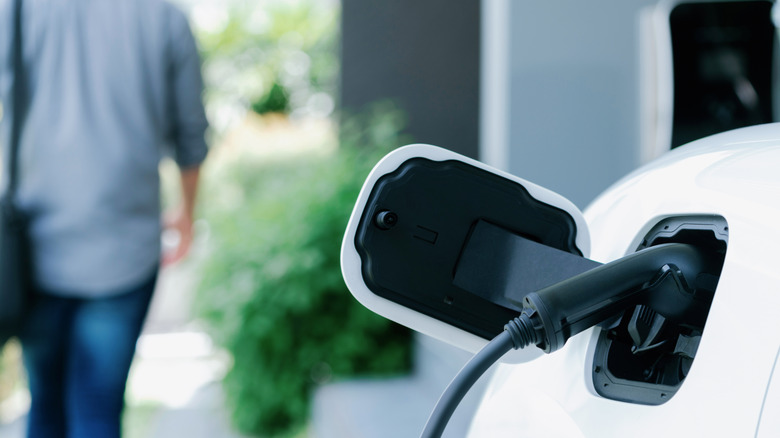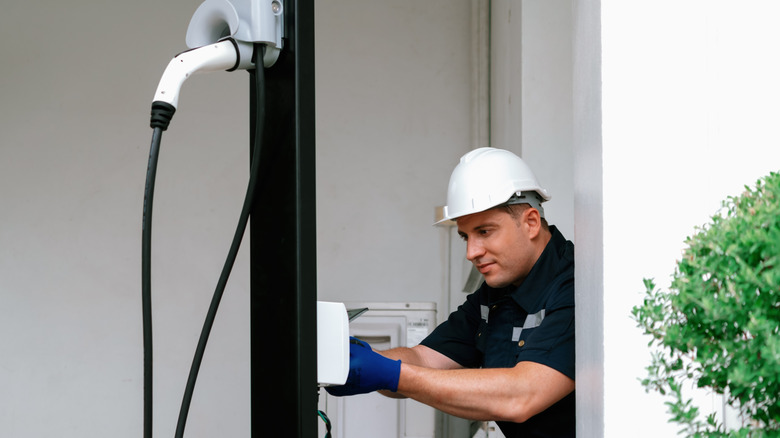Will Adding A Level 2 EV Charger Help Or Hurt Your Home's Resale Value? Our Expert Weighs In
Electric vehicle sales reached record highs in 2024. Despite complex political uncertainty around future tax credits, tariff-related price increases, and shifting environmental standards, automakers continue to add new electric vehicles (EV) to their lineups. Along with deciding which make and model to purchase, EV owners also have to navigate various charging options. The least expensive choice is to simply plug a car's electric vehicle supply equipment into a common residential 120-volt outlet. Although it doesn't require any special equipment, this is the slowest option, taking several hours to fully charge either a battery electric vehicle or a plug-in hybrid electric vehicle.
Level 2 EV equipment offers a faster charge thanks to 240-volt outlets that are specially installed. But is the investment worth it? House Digest did an exclusive interview with broker Eric Bramlett of Bramlett Residential to find out if adding a level 2 EV charger helps or hurts your home's resale value.
The U.S. Department of Transportation estimated in 2020 that the average cost to install level 2 chargers and outlets in a single-family home was $1,400. In older homes with aging electrical systems, these costs can increase if new breaker boxes, upgraded circuits, or other improvements are also necessary. "Adding a high-quality level 2 electric vehicle charger is most likely going to improve the resale value of a home due to the practical, environmental, and financial benefits," Bramlett told us. "The estimated resale value could be anywhere from $3,000 to $5,000, according to the National Association of Property Buyers (NAPB), and I'd certainly agree with this number," he added.
There are many pros to installing a level 2 charger
Even after determining how much it costs to install an EV car charger in your home, the idea of never pumping gas again appeals to a lot of people. "I definitely think that there are plenty of pros for adding a level 2 EV charger to your home," real estate expert Eric Bramlett told House Digest during his exclusive interview, "from saving energy costs to charging up your car's battery quicker." Compared to volatile prices at the pump, the cost to charge an electric car is a major benefit to going electric. Research has consistently shown significant savings benefits, thanks to both reduced fuel expenses and greater efficiency.
"Having your own charger is more convenient and can save you money since you can charge the vehicle overnight during lower off-peak electricity rates," Bramlett explained. "You can save on energy costs if the EV charger is connected to solar panels," he said, before reminding potential EV owners that they may also be eligible for financial incentives, tax benefits, or manufacturer rebates.
While purchasing an EV involves higher upfront costs, owners spend less on operating expenses than with gas-powered vehicles. And those upfront costs are coming down as competition increases between automakers, battery costs decrease, and used vehicles start to flood the market, making both electric vehicles and chargers a good overall investment.
Resale value depends on how EV-friendly your area is
"On the flip side, there are some cons of adding a level 2 EV charger to your home," Eric Bramlett said during an exclusive interview with House Digest. "... The initial cost can be pretty expensive." Installing a vehicle charger is among the electrical projects you don't want to attempt unless you're a professional. From acquiring the appropriate permits and running dedicated wiring to mounting the charging unit and testing to make sure everything is safely grounded, it's a complex undertaking that's best left to the experts. "While some homebuyers will see the addition as a useful perk, others might find it unnecessary," Bramlett cautioned. He said it depends on the market and EV adoption in your area.
While there is no guarantee that adding a level 2 EV charger will increase your particular home's resale value, experts at Realtor.com are working to determine the markets with the highest demand for EV-friendly homes. According to their research blog, markets with higher EV ownership rates naturally have the greatest demand for homes with dedicated chargers. Honolulu, Portland, San Jose, Salt Lake City, San Francisco, Boston, and Seattle are the housing markets where you can expect the addition of a level 2 EV charger to create the greatest positive impact on your home's resale value, because these are the most EV-friendly housing markets overall. As electric vehicles continue to grow in popularity, more areas are likely to be added to the list.


